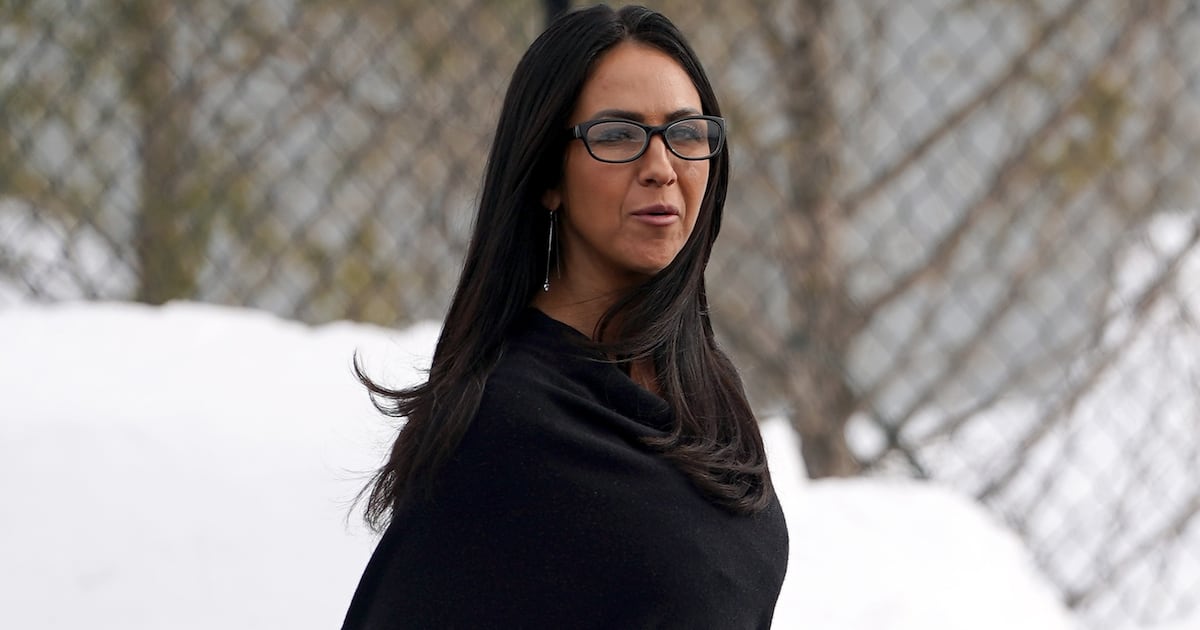In late October, three House Democrats held a press conference outside the U.S. Capitol to lay down an unequivocal condition for their support of President Joe Biden’s Build Back Better Act: It had to contain significant immigration reforms.
One of those Democrats, Rep. Lou Correa of California, recalled watching Democratic majorities and a Democratic president fumble away an opportunity to address immigration a decade ago—and he was determined not to let it happen again.

Rep. Lou Correa (D-CA) and other House members talk about protection for undocumented communities during a press conference.
L Nolly/SOPA Images via AP“My concern,” Correa told The Daily Beast on Oct. 20, “the concern of my constituents, is another replay of that scenario.”
Several weeks later, Biden has outlined a framework for the Build Back Better Act forged by painful compromises among liberals and moderates working under slim majorities. Many congressional Democrats have dropped their red lines—on everything from Medicare expansion to paid family leave—in a race to pass the bill as soon as possible.
Immigration, however, remains one of the few outstanding dilemmas threatening to hold up the entire package, as Correa and two colleagues, Reps. Chuy García (D-IL) and Adriano Espaillat (D-NY), have stood firm in their demands to include it.
“We have to address it. It’s been 35 years,” Correa told reporters on Tuesday morning. “This is a big opportunity that should not be passed up.”
The top priority for these Democrats had been to use the Build Back Better Act as an opportunity to establish a path to citizenship for some 7 million undocumented immigrants brought to the U.S. as children, the so-called Dreamers, whose legal status remains in limbo. With Donald Trump’s GOP firmly dug in against virtually any immigration overhaul, most Democrats believe they’ll have to go it alone to provide relief to these migrants.
But the unique problem with drawing a red line on immigration is that honoring it would require breaking the Senate’s rules. That’s because Democrats are using the special budget reconciliation process to pass their $1.75 trillion spending bill with a simple majority. Under those rules, only provisions with an impact on the federal budget may be included. And the Senate rules enforcer, the parliamentarian, has previously decided that a path to citizenship can’t be done by reconciliation.
On Tuesday night, POLITICO reported that Democrats were close to finishing a compromise agreement that could satisfy those holdouts—at least until the parliamentarian weighs in.
The reported compromise would not grant a pathway to citizenship for Dreamers, but would provide work authorizations for five years for most of them, which immigration advocates would take as a win.
Still, the parliamentarian Elizabeth MacDonough has rejected earlier immigration ideas for the Build Back Better Act twice now, on the grounds that the magnitude of the proposed policy changes “vastly outweighs” any budgetary impact.
Some Democrats who have worked to craft immigration reform in the past, like Sen. Richard Blumenthal (D-CT), are frank in their view that the party has, for now, reached a dead end on moving forward meaningful reforms.
“We’re going to have to fight another day on immigration, for comprehensive reform,” Blumenthal told The Daily Beast, “because it simply is not going to be achieved in this bill.”
But with virtually no room for defections, three determined Democratic lawmakers are nearly enough on their own to sink the bill in the House, if they insist on its inclusion. And many more progressive lawmakers are sympathetic to the immigration push.
Democrats—particularly progressives—have made immigration reform a central issue in recent years, and many worry about the political blowback from important parts of their coalition if they do not make real headway now. Rep. Ilhan Omar (D-MN) told The Daily Beast that failure amounts to “continued broken promises” to the constituencies demanding reform.
The chair of the Congressional Progressive Caucus, Rep. Pramila Jayapal (D-WA) told The Daily Beast on Tuesday that they “have to have” strong immigration language, even as immigration has fallen as a focus from her 90-member bloc, which has largely prioritized health care and climate priorities.
Meanwhile, several Democrats told The Daily Beast that lawmakers facing tough races in 2022 are warily eyeing the brewing fight. Republicans intend to lean on immigration and border security as a key theme in these midterms, and they are already attacking Democrats over the issue.
Vulnerable Democrats might take a politically difficult vote if immigration language could clear the Senate’s rules. But they might be more skeptical of a vote on language the parliamentarian could strip out that results only in political heat for them.
“We have members that I think are willing to vote for the bill,” said Rep. Mark Takano (D-CA), a leading progressive. “They don’t want to walk the plank twice. So that’s kind of our conundrum.”
With the farthest-reaching reforms clearly off the table, the question then becomes what these holdout Democrats will accept as sufficient—or if they will simply take a symbolic vote on doomed language as enough—and what will be politically palatable for the vast majority of their colleagues.
The latest attempt to keep real immigration reform alive in the Build Back Better Act, dubbed “Plan C,” follows two previous bids to include provisions in the reconciliation package that would provide a pathway to citizenship for certain undocumented immigrants residing in the United States.
Those provisions were rejected by MacDonough, the chamber’s chief adviser on parliamentary procedure, who ruled that previous bids to create a pathway to legal status violated the “Byrd Rule,” which bars reconciliation legislation from containing non-budgetary provisions.
Democrats’ latest attempts at creating a route to legal status would stop short of a pathway to citizenship or full legal residency status in the form of a green card, advocates told The Daily Beast.
“It’s really like a permit program—it’s a work permit and protection from deportation, and the ability to apply to travel in and out of the country,” said Naureen Shah, a senior policy counsel on immigrants’ rights at the American Civil Liberties Union. Shah said the proposal, while stopping short of granting permanent residency or a pathway to citizenship, would “make a huge difference in people’s day-to-day lives,” granting work permits to nearly 8 million people.

A march in support of a pathway to citizenship for immigrants on July 23, 2021, in New York City.
Michael M. Santiago/GettyThe proposal would protect undocumented immigrants who have been in the United States for longer than 10 years from deportation, and would give them access to work permits while stopping short of making them permanent legal residents.
Those with the permits would be granted protection from deportation for up to a decade—by which time, Shah said, there may be an appetite for a framework that would grant them permanent status or a pathway to citizenship.
“It’s a lifeline for people who are afraid of deportation and have to live with that fear and who also can’t even get authorization to work or,” Shah said, while noting that the ACLU had not endorsed any specific proposals in the reconciliation package beyond broader immigration system reform. “So it makes a big difference.”
Democrats had originally hoped to move up the eligibility window for permanent residency to immigrants who have been in the United States since 2011—current law only allows those who have lived here since 1972 to apply for a green card—but MacDonough ruled in September that the maneuver amounted to a “tremendous and enduring policy change that dwarfs its budgetary impact,” violating the Byrd Rule.
While some House Democrats—including Correa, García, and Espaillat—have advocated ignoring MacDonough’s rulings, the White House has tamped down speculation that her decisions could be bypassed, noting that it would require the kind of Senate cooperation that has not exactly been rich on the ground in the negotiations over the reconciliation package.
“It is not just waving a magic wand,” White House press secretary Jen Psaki told reporters last month. “It requires a majority of votes in the Senate, and it requires the vice president… I would point to Leader Schumer and others to ask the question of whether there is the opportunity or the appetite to do that.”
The Build Back Better framework introduced last week does have some immigration measures, even if they are far more meager than many lawmakers want. It includes $100 billion to reduce backlogs in immigration courts and increase processing speeds for asylum claims, as well as to expand access to legal representation within the immigration legal system. Details on the specifics of the appropriation, however, are still sparse.
A failure to include any changes of status or protections for undocumented immigrants, however, could risk alienating communities that had backed Biden’s bid for the White House over his promises to reform a broken system.
“If you’re looking at having a Democratic Congress and a Democratic president, and yet we still couldn’t get the so-called ‘pathway to citizenship,’ what kind of precedent has that set?” Shah said. “If they’re not actually willing to deliver anything for those voters, family members and neighbors, if the congressional Democrats fail to deliver some form of relief from deportation for these individuals, all eyes will be on the White House to see what it’s going to do to make up for that.”
In the eyes of other Democratic lawmakers, the scope of the Build Back Better legislation is too big—and many of its other contents too crucial—for lawmakers to be laying down red lines at this stage.
Rep. Andy Kim (D-N.J.), one of a half-dozen Democrats who represents a district Trump won in 2020, said he has no problem supporting immigration reform. He said that Democrats are often preoccupied with how Republicans will attack them, but in his two tough election victories, he said he learned that “you don't win elections by playing defense.”
Kim believes it is “unhelpful” for lawmakers to say they will not vote for the bill if it doesn’t contain a certain provision, however. “It’s the last, best chance for us to do what we need to on climate change, too,” he told The Daily Beast.
The Democratic holdouts acknowledge this, but seem to argue that failure to clarify the legal status of millions of people justifies their stance.
“It’s a fair issue,” said Correa, when asked about his colleagues’ wariness of the immigration push. “But we deal with difficult issues all the time. That’s why we get paid.”












